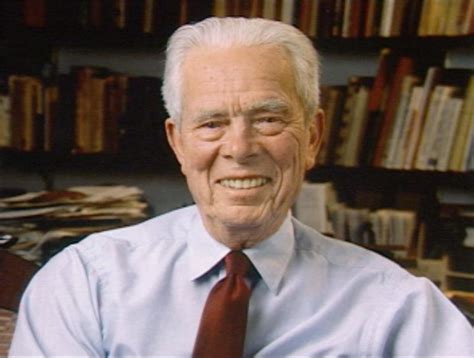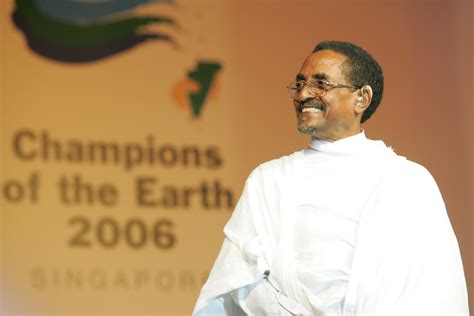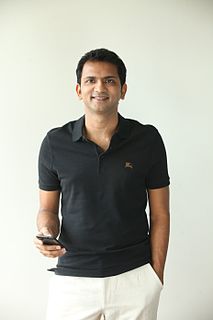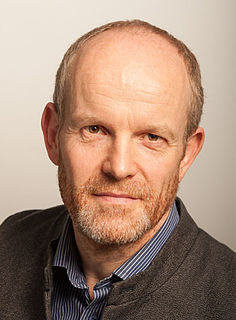Top 986 Sustainable Quotes & Sayings - Page 17
Explore popular Sustainable quotes.
Last updated on April 16, 2025.
I am always a little skeptical on the water thing because I have been hearing that for 30 years, but one year it's going to be true. With the rising populations, Yemen could be the first country in the world, or Sana'a the first major city in the world, to run out of water, that's from Yemeni hydrological engineers and the United Nations. Sooner or later, all of these people, from 7 to 9 billion, all of them want to live like America, will be consuming so much more water that some of the societies will hit a wall without more sustainable environmental practices.
Community after community is rising up, ranchers, developers, environmentalists, and local commissioners, all saying this is not the best use of our public lands. It is a story that is largely unknown in the rest of the country. It is a disturbing and community-destroying example of domestic imperialism being waged against people in places deeply connected to the public lands that are our public commons. The Bush energy policy is a short-term strategy based on corporate greed instead of a sustainable vision of what best supports local economies and healthy ecosystems.
The path towards sustainable energy sources will be long and sometimes difficult. But America cannot resist this transition, we must lead it. We cannot cede to other nations the technology that will power new jobs and new industries, we must claim its promise. That's how we will maintain our economic vitality and our national treasure-our forests and waterways, our crop lands and snow-capped peaks. That is how we will preserve our planet, commanded to our care by God. That's what will lend meaning to the creed our fathers once declared.
Let me say two things about the costs - one is that there are detailed studies that show this, this is what some of the Stanford studies show, in fact, that we get so healthier, so much more healthy, when we eliminate fossil fuel pollution - 200,000 [fewer] premature deaths a year for example. And that's just the death part of it. Not to mention the asthma part of it, the heart attacks and the strokes and the cancers. And we also call for a healthy food system that prioritizes sustainable healthy local food production.
It is increasingly obvious that environmentally sustainable solutions to world hunger can only emerge as people eat more plant foods and fewer animal products. To me it is deeply moving that the same food choices that give us the best chance to eliminate world hunger are also those that take the least toll on the environment, contribute the most to our long-term health, are the safest, and are also, far and away, the most compassionate towards our fellow creatures.
Let me put it in a rather larger picture framework. Let's go to the longest time frame, the time frame of the life of our sun. As a star, our sun is about halfway through its life cycle. In the long run, we only have a couple of billion more years likely that we can inhabit this planet. By that time, we're going to have to be out of here before our sun dies. Now, I don't think we need to wait that long, and we certainly shouldn't wait that long. At the moment, we are not on a sustainable path.
The pursuit of happiness is enshrined in the Declaration of Independence as a right of all Americans, as well as on the self-improvement shelves of every American bookstore. Yet the scientific evidence makes it seem unlikely that you can change your level of happiness in any sustainable way. It suggests that we each have a fixed range for happiness just as we do for weight. And just as dieters almost always regain the weight they lose, sad people don't become lastingly happy, and happy people don't become lastingly sad.
We need to realize that these industrial methods of farming have gotten us used to cheap food. The corollary of cheap food is low wages. What we need to do in an era when the price of food is going up is pay better wages. A living wage is an absolutely integral part of a modern food system, because you can't expect people to eat properly and eat in a sustainable way if you pay them nothing. In fact, it's cheap food that subsidized the exploitation of American workers for a very long time, and that's always been an aim of cheap food.
I spent the first years working in Jordan trying to learn as much as I could about what was taking place in the country, about where there were gaps in the development process that needed attention. Inevitably, there were certain common denominators which are fairly common to all developing societies, perhaps to all societies: that quality education be accessible to everyone, not just a limited elite few; the sustainable conservation of natural resources; the full engagement of women in national development; and the value of cross-cultural exchange and understanding to international relations.
As citizen-activists the world over merge, they can become an irresistible force to create peace and protect the planet. From here will come a new movement to abolish nuclear weapons and all weapons of mass destruction. From here will come the demand for sustainable communities, for new systems of energy, transportation and commerce. From here comes the future rushing in on us. How does one acquire the capacity for active citizenship? The opportunities exist every day...Active citizenship begins with an envisioning of the desired outcome and a conscious application of spiritual principles.
Jay Harman is the quintessential biomimic, a principled inventor who sees solutions everywhere he looks in the natural world. And he looks deeply, with the soul of a student. He moves with grace from a world of waving sea kelp to the world of sustainable design, bringing nature's wisdom into the board rooms of global companies, to the design tables of the engineers and designers who make our world. This is more than a business book, more than a memoir, more than a new way to solve global challenges. It's a book about a new way to think.
Liberalism is unsustainable. When things go wrong in liberalism they pile more liberalism on top. Pretty good example of what's wrong with the US budget, US healthcare. Liberalism breaks it. Government breaks it. They pile more liberalism on top of it until it eventually implodes, like Obamacare is going to, or like Social Security is going to. All of these things, they're not sustainable, because liberalism isn't.
I really support criticism as a craft and as a vocation. People who devote as much time to thinking about sound through writing as I do practicing and forming it, the whole system of journalism seems to not yield rewards sustainable as a craft. So few can spend enough time to be serious about it and approach it with confidence and a kind of depth. And that's good on one level, because you have some leveling, that's kind of maybe leveled the petty fiefdoms of undeserving people but it's also made it hard to make a living as a writer.
I now say that the world has the technology - either available or well advanced in the research pipeline - to feed on a sustainable basis a population of 10 billion people. The more pertinent question today is whether farmers and ranchers will be permitted to use this new technology? While the affluent nations can certainly afford to adopt ultra low-risk positions, and pay more for food produced by the so-called "organic" methods, the one billion chronically undernourished people of the low income, food-deficit nations cannot.
We need scientists to design new fuels. We need farmers to help grow them. We need engineers to invent new technologies. We need entrepreneurs to sell those technologies. We need workers to operate assembly lines that hum with high-tech, zero-carbon components. We need builders to hammer into place the foundations for a clean energy age. We need diplomats and businessmen and women, and Peace Corps volunteers to help developing nations skip past the dirty phase of development and transition to sustainable sources of energy. In other words, we need you.
I understand, of course, that grain-fed meat is not the cause of the world hunger problem - and eating some of it doesn't directly take food out of the mouths of starving people - but it is, to me, a symbol and a symptom of the basic irrationality of a food system that's divorced from human needs. Therefore, using less meat can be an important way to take responsibility. Making conscious choices about what we eat, based on what the earth can sustain and what our bodies need, can help remind us that our whole society must begin to balance sustainable production with human need.
The good news about fresh water is that, even after accounting for the larger volume of water that is unavailable to people from the hydrologic cycle, there is enough on a global scale to support current and anticipated populations on a sustainable basis... Three essential goals are dependable and safe supplies for people, protection and management of the environmental systems through which water moves, and efficient water use. Meeting these goals will require that fresh water not continue to be treated as a free good or as the principal means for disposing of human and industrial wastes.
The Nuffield report suggests that there is a moral imperative for investment into GM crop research in developing countries. But the moral imperative is in fact the opposite. The policy of drawing of funds away from low-cost sustainable agriculture research, towards hi-tech, exclusive, expensive and unsafe technology is itself ethically questionable. There is a strong moral argument that the funding of GM technology in agriculture is harming the long-term sustainability of agriculture in the developing world.
The more I do this creative work teaching the "Personal Creativity in Business" course at Stanford the more I realize that business is about people in groups being creative in their own way. If business creativity does not allow individual development, then it isn't sustainable. But if business creativity means people bringing out their best and developing that, then amazing things can happen - not only for the business but also more importantly for the individual and the surrounding community.
Education as a democratic project always presupposes a vision of the future in its introduction to, preparation for, and legitimation of particular forms of social life. It is utopian in its goal of expanding and deepening the ideological and material conditions that make a democracy possible. As a moral and political practice, education produces the modes of literacy, critique, sense of social responsibility, and civic courage necessary to imbue young people with the knowledge and skills needed to enable them to be engaged critical citizens willing to fight for a sustainable and just society.
Both rich and poor nations have a common stake in policies that put the globe on a sustainable development path. The conflict is less between poor and rich countries than between the broad interests of people and the narrow interests of extractive industries. We need to find our way towards some kind of global regime that reduces emissions of the greenhouse gases, but well-off nations need to transfer the technology to make this possible, rather than viewing this shift as one more opportunity for private industry to profit.
People need open space. People need to bring their children into an area where they can play without restriction." And I was told, "This is development." And I said, "That is not development, definitely not sustainable development, definitely not responsible development. People need fresh air. They can do without buildings. They can do without concrete. But they cannot do without fresh air.
If you have a strong business idea, then it is comparatively easy now to get capital. It is a positive thing that increasingly more people want to join the startup bandwagon. However, to build a successful business, focus on creating more value through the product, and direct your efforts on solving real issues. If you manage to build a sustainable product, revenue will follow. A lot of startups fail because they concentrate on incremental innovations, increasing user base, and monetisation before strengthening the core of their business.
There are a lot of products still to be discovered in the world and experimentation, for example with seafood and fish. There are thousands of products that we're not eating right now that maybe will be cultivated in a good agriculture situation, a sustainable, ecological way. Maybe there will be textures or flavors we hadn't even thought of. In the Amazon there are 400 fruits that are not cultivated right now. They're just incredible fruits. Textures, tastes that we don't know right now.
Britain has squandered its windfall of natural resources from North Sea oil and gas. Instead of prudently investing the 'unearned income' from nature, to build a safe, clean and green energy supply for the nation, we face unnecessary shortages. But there is still a chance to put the proceeds from liquidating our fossil fuel assets to better and more appropriate use. Instead of oil companies profiteering from climate change and oil depletion, a windfall tax could establish an Oil Legacy Fund to pay for Britain's urgent transition to a sustainable, decentralised energy system
You can have a strong economy or you can help the environment, but you can't do both at the same time. That's ridiculous. In fact, as a sustainable vision for a healthy economy has to involve changing our energy policy and changing with respect to the natural world. Because we're hitting nature's thresholds, we're hitting nature's limits with respect to water and crop yields and energy use and fossil fuels heating the atmosphere at the same time we're past global peak and running out of that.
























